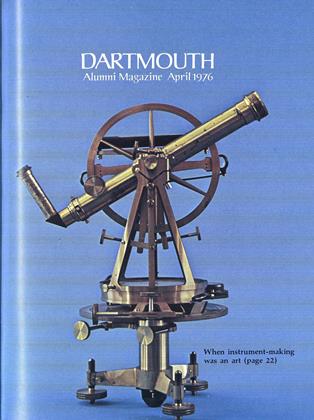Patten D. Allen '26, ed. Echoes: 500 Thoughtsfor Today from American Revolutionary Personalities. Crescent, Los Angeles. 85 pp. $2. Allen has arranged by subject 500 short quotations from writings of the Founding Fathers on such themes as the Revolution, the Constitution, independence, human rights, and citizenship. His aim is to bring "into the reader's orbit of familiarity . . . their own words echoing across the chasm of 200 years, often relating to current concerns." Since some rather less familiar passages from letters and diaries of famous spokesmen for the Revolution are included, the book well may, as the editor hopes, enhance a "sense of participation in the Bicentennial."
Kenneth Andler '26. Mission to Fort No. 4. Regional Center for Educational Training, Hanover. Illustrated. 64 pp. Hard cover, $4.95; paper, $1.95. A book for children hearing the logos of the national, the New Hampshire, and the Vermont Bicentennial Committees, Mission recounts the adventures of a 15-year-old boy as he and his Uncle Samuel walk the Province Road from Bedford to Charlestown, New Hampshire, in the summer of 1775. The book relies on authenticity of detail. The main characters are fictional, but the story reflects Andler's intimate familiarity with actual New Hampshire history, geography, personages, and events.
Ronald H. Chilcote '57 and Joel Edelstein, coeds. Latin America: The Struggle withDependency and Beyond. Schenkman. 781 pp. Hard cover $24.75; paper, 9.50. A coherent group of essays, each by a scholar-specialist, on such related themes as underdevelopment, economic exploitation, poverty, and social and political change in Guatemala, Mexico, Argentina, Brazil, Chile, and Cuba. The volume is part of a series on "States and Societies of the Third World," and the editors contribute an 87-page introduction tracing the post-1960 economic history of the Third World nations of Latin America and concluding that in the future Latin America will show the United States "a variety of alternatives to our present structure and institutions."
 View Full Issue
View Full Issue
More From This Issue
-
 Feature
FeatureWORDS AND PICTURES MARRIED The Beginnings of DR.SEUSS
April 1976 By Edward Connery Lathem -
 Feature
FeatureStrangers in the House?
April 1976 By RAYMOND L.HALL -
 Feature
FeatureLap After Grim Lap, Note After Sparkling Note
April 1976 By DAVID M. SHRIBMAN '76 -
 Feature
FeatureTHE 18th century highboys of Benjamin Randolph's
April 1976 By ALLEN L. KING -
 Class Notes
Class Notes1975
April 1976 By GILBERT F. PALMER IV, FREDERICK H. WADDELL -
 Article
ArticleVox Clamantis et Clamantis; or College Bites Man
April 1976 By TERENCE R. PARKINSON '71
Article
-
 Article
ArticleFaculty and Staff Members in Service
November 1942 -
 Article
ArticleHUMAN RELATIONS ENDOWED
October 1961 -
 Article
ArticleTeamwork
November 1979 -
 Article
ArticleAn Honor for the Editor
December 1989 By Carl L.N. Erdman '37 -
 Article
ArticleAbout the Artist
Mar/Apr 2003 By Lauren Gee '03 -
 Article
ArticleThe Faculty
JUNE 1968 By WILLIAM R. MEYER

